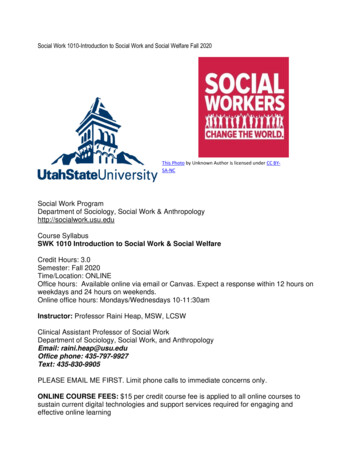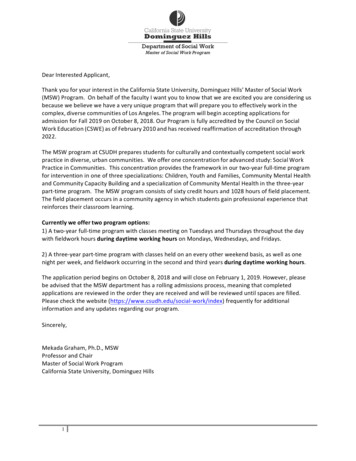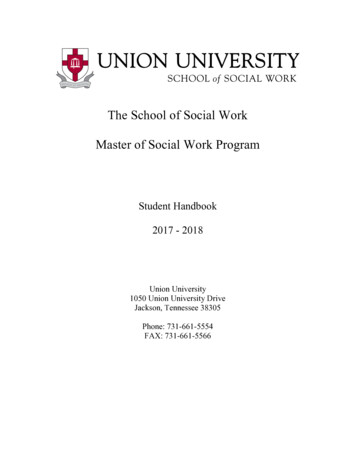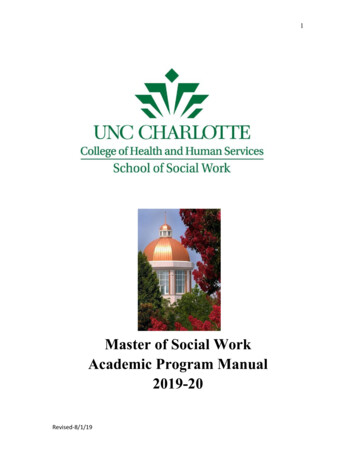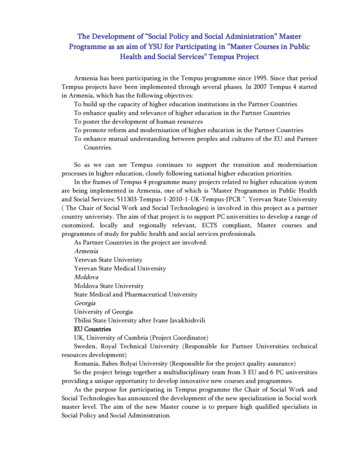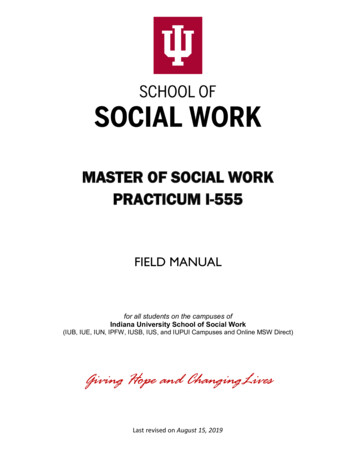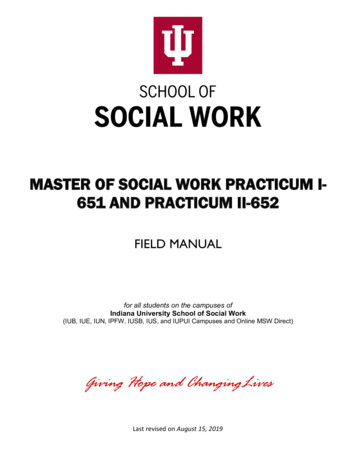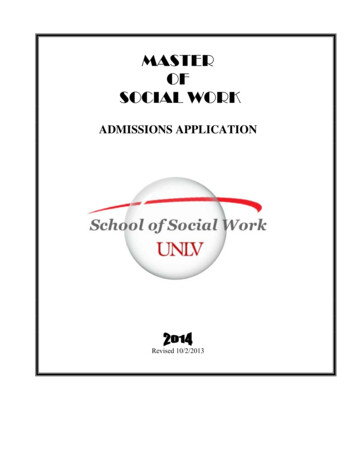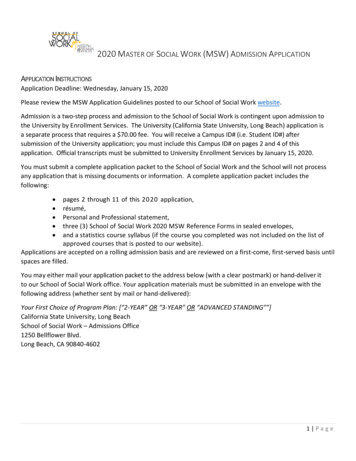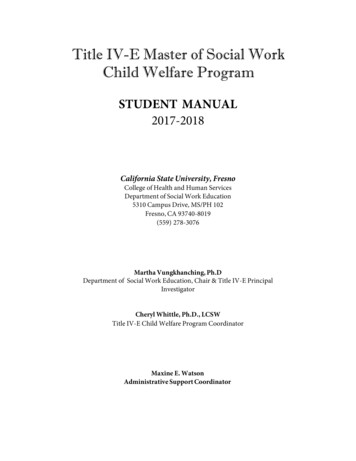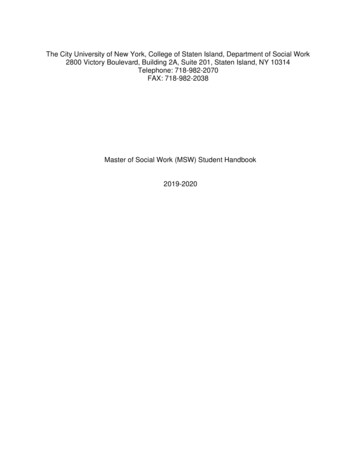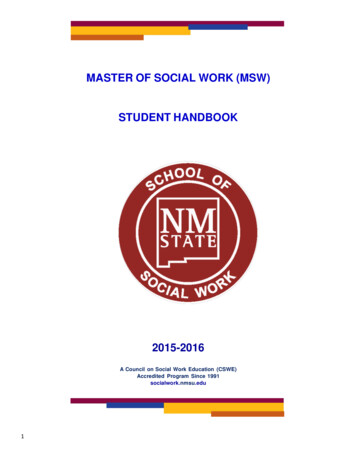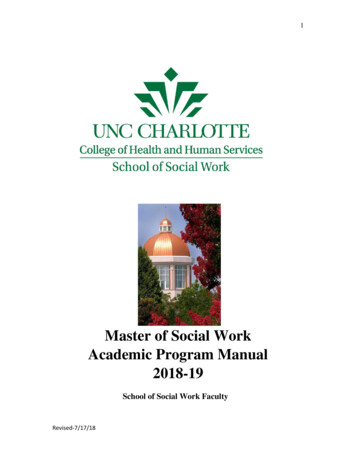
Transcription
1Master of Social WorkAcademic Program Manual2018-19School of Social Work FacultyRevised-7/17/18
2MSW Program DirectorDiana Rowan, PhD, MSW, LCSW, Associate ProfessorPart-time MSW Program CoordinatorMr. Roger Suclupe, MSW, LCSW, Clinical Assistant ProfessorField Education DirectorTicola Ross, PhD, MSW, Clinical Assistant ProfessorDr. A. Suzanne Boyd, PhD, ACSW, CMSW, Associate ProfessorDr. Tianca Crocker, PhD, MSW, Assistant ProfessorMrs. Frances Ferrante, MSW, Field Education Coordinator and Clinical AssistantProfessorDr. Travis Hales, PhD, MSW, Assistant ProfessorDr. Schnavia Smith Hatcher, PhD, MSW, School of Social Work Director and ProfessorDr. Shanti Kulkarni, PhD, Associate ProfessorDr. E. Othelia Lee, PhD, MSW, Associate ProfessorDr. Susan McCarter, PhD, MSW, Associate ProfessorDr.Annelise Mennicke, PhD, MSW, Assistant ProfessorDr. Julian Montoro-Rodriguez, PhD, Director of Gerontology and ProfessorMrs. Amy Peters, MSW, School of Social Work Assistant Director and Senior LecturerDr. Andrew Reynolds, PhD, Assistant ProfessorMrs. Sonyia Richardson, MSW, LCSW, Clinical Assistant ProfessorDr. Cheryl Waites Spellman, EdD, MSW, LMSW, Associate ProfessorDr. M. Lori Thomas, PhD, MSW, M.Div., Associate ProfessorSchool Address and Contact Information:The University of North Carolina at CharlotteCollege of Health and Human ServicesSchool of Social Work9201 University City BoulevardCharlotte, North Carolina 28223-0001Phone: 704-687-7938; FAX: 704-687-2343Website: https://socialwork.uncc.edu/MSW Website: rsity of North Carolina at Charlotte Graduate dents/catalogCollege of Health and Human Services Student evised-7/17/18
3Common AcronymsMSW Master of Social WorkBSW Bachelor of Social WorkSSW School of Social WorkCWEC North Carolina Child Welfare Education CollaborativeCHHS College of Health and Human Services f2f Face-to-face class or meetingFT Full TimePT Part TimeAS Advanced StandingRevised-7/17/18
4Table of ContentsSchool of Social work Vision and Mission6The MSW Program6Educational Objectives and Curriculum7Foundation Courses7Advanced Courses8Elective Courses9RegistrationMSW Curriculum & Plans of Study1111Full Time Plan of Study (Two Years)12Part Time Plan of Study (Three Years)13Advanced Standing Plan of Study (One Year)15Graduate School Catalog Descriptions of MSW Courses16Graduate School Academic Policies15Minimum Hours and Quality16Grading Policies and Grade Point Averages16I (Incomplete) Grades17Grades and Academic Standing18Time Limits to Degree18Accommodations for Disabilities17School of Social Work Academic PoliciesCourse Substitution Policy118118Transfer of Credits19Post-Baccalaureate Policies19Field Practicum Grades20Cohort Use of Social Media Sites20Academic Advising221University Supports221Graduate & Professional Student Government (GPSG)222Center for Wellness Promotion222UNC Charlotte Counseling Center222Multicultural Resource Center (MRC)Revised-7/17/1823
5Office of Disability Services (ODS)23Writing Resource Center223School of Social Work Special Programs24North Carolina Child Welfare Education Collaborative223School Social Work Certification Credits223Early Childhood Mental Health Certificate224Graduate Certificate in Gerontology224Post-Graduate Licensure Eligibility224Student Participation in Academic Governance26Graduate and Professional Student Government26Student Organizations225Graduate Social Work Association26Advocates For Change225Phi Alpha Honor Society226Student Academic Performance and Conduct Grievance ProceduresUniversity Level Policies and ProceduresError! Bookmark not defined.School of Social Work Policies Regarding Student ConductSchool of Social Work Multi-Step Resolution Process3028Error! Bookmark not defined.Student Termination by the University31MSW Student Reinstatement after Suspension31Student-Initiated Grievance Procedures32Student Concerns about a Course Instructor32Special Note about Sexual Harassment33Other Important University and School of Social Work Policies331Nondiscrimination Policy331Gender-Neutral Bathrooms332Religious Accommodation332There are three important manuals that you need to review as a Master of SocialWork Student: 1) MSW Program Manual; 2) Social Work Admission Handbook, and 3)Field Education Handbook.School of Social Work Vision and MissionRevised-7/17/18
6Vision StatementTo foster optimal health and well-being, equal human rights, and a just society.Mission StatementTo prepare future social work professionals for leadership in areas of culturallyinformed, community-engaged practice, policy, and research, with a particularemphasis on persistent and emerging social problems in rapidly diversifying urbanareas locally, nationally, and globally.The MSW ProgramThe MSW program carries out the School’s vision and mission by grounding studentsin social work’s ecological framework. The program educates future social workers tothink and work multisystemically – to keep a simultaneous focus on people, their socialenvironments, and their reciprocal relationships, while actively influencingorganizations, communities, and social policy to bring about a more just society.Students in the program also have an opportunity to develop areas of specializationthrough elective courses in the School of Social Work and other departments at UNCCharlotte.Program AccreditationUNC Charlotte’s MSW program was re-accredited by the Council on Social WorkEducation (CSWE) in 2016. The program is re-accredited through 2024.History of the MSW ProgramThe University of North Carolina at Charlotte is North Carolina’s urbanresearch university. It leverages its location in the state’s largest city to offercompetitive programs of research and creative activity, exemplary undergraduate,graduate, and professional programs, and a focused set of community engagementinitiatives.UNC Charlotte’s MSW program began in 2000. In its first decade, the MSWprogram has begun to achieve national prominence. In 2014, UNC Charlotte’sDepartment of Social Work conducted an analysis of its program in comparison toUNC Charlotte peer institutions and other BSW and MSW programs in North Carolina.The analysis found that faculty research productivity outranked departments in peerinstitutions. Based on its findings, the Department of Social Work formally proposed aname change to “School of Social Work” in February 2014. In the latest opinionpolling by U.S. News and World Report (2018), UNC Charlotte’s MSW program ranksRevised-7/17/18
7#54, which places it in the top 25% of all MSW programs. It is the highest rankedMSW program in the US without an affiliated social work doctoral program.The UNC Charlotte Board of Governors unanimously approved theDepartment’s designation as a School of Social Work on September 25, 2014. Thedesignation as a School of Social Work opened the next chapter in our history, one inwhich our teaching, research, and service position faculty and students for engagedleadership in the University, the Charlotte region, the state, and the country.Educational Objectives and CurriculumEducational objectives for the MSW program are directly aligned with the Council onSocial Work Education’s 2015 Educational Policy and Accreditation Standards(EPAS). There are two levels of curriculum: Foundation and Advanced.Foundation CurriculumThe Foundation Curriculum is designed to promote knowledge, values, skills, andcritical thinking skills required for the practice of social work. The FoundationCurriculum addresses the nine social work competencies from 2015 EPAS. Theseinclude:Competency 1: Demonstrate Ethical and Professional BehaviorCompetency 2: Engage Diversity and Difference in PracticeCompetency 3: Advance Human Rights and Social, Economic, and EnvironmentalJusticeCompetency 4: Engage in Practice-informed Research and Research-informed PracticeCompetency 5: Engage in Policy PracticeCompetency 6: Engage with Individuals, Families, Groups, Organizations, andCommunitiesCompetency 7: Assess Individuals, Families, Groups, Organizations, and CommunitiesCompetency 8: Intervene with Individuals, Families, Groups, Organizations, andCommunities Competency 9: Evaluate Practice with Individuals, Families, Groups,Organizations, and CommunitiesFor more information, on the 2015 accreditation standards, see the EPAS /AccreditationProcess/2015EPAS/2015EPAS Web FINAL.pdf.aspxThe Foundation Curriculum consists of nine (9) courses that are offered in thebeginning of the course sequence. In the Foundation Curriculum, students spend 16hours in a field practicum each semester. Foundation courses are listed below.Revised-7/17/18
8Foundation CoursesSOWK 6121 Social Work Practice Theories and Skills (3)SOWK 6131 Social Work Research (3)SOWK 6141 Foundations of Social Work (3)SOWK 6151 Social Work, Social Justice, and Diversity (3)SOWK 6232 Practice and Program Evaluation (3)SOWK 6242 Advocacy and Policy Change (3)SOWK 6252 Mental Health Assessment (3)SOWK 6441 Foundation Social Work Practicum I (3)SOWK 6442 Foundation Social Work Practicum II (3)Students chose three (3) electives in consultation with their academic advisors.Electives provide an opportunity to develop a specialty practice area.Advanced CurriculumLike the Foundation Curriculum, the Advanced Curriculum is designed to promoteknowledge, values, skills, and critical thinking skills required for the practice of socialwork. The Advanced Curriculum also addresses 2015 EPAS competencies. TheAdvanced Curriculum consists of seven (7) courses, which include an advanced levelpracticum requiring 16 hours weekly for two semesters. Students are expected to applyskills learned in the Foundation curriculum to the Advanced curriculum.Advanced coursesSOWK 7122 Advanced Social Work Practice with Individuals (3)SOWK 7126 Advanced Social Work Practice with Groups (3)SOWK 7127 Advanced Social Work Practice with Families (3)SOWK 7222 Advanced Social Work Practice with Communities and Organizations I(3)SOWK 7223 Advanced Social Work Practice with Communities and Organizations II(3)SOWK 7443 Advanced Social Work Practicum I (4)SOWK 7444 Advanced Social Work Practicum II (4)SOWK 7651 Synthesis and Reflection (3)Elective CoursesMSW students consult with their advisors to choose electives that reflect theirindividual professional interests and goals. Students in the Full Time and Part Timeplans of study complete three electives (nine credits). Students in the AdvancedRevised-7/17/18
9Standing plan of study complete two electives (six credits) during the Advancedcurriculum.The following is a list of Pre-Approved Electives for the MSW Program. These areelectives offered at UNC Charlotte in other graduate programs. Students are allowed totake ANY graduate level social work (SOWK) elective that is 5000-level or above.Pre-Approved MSW ElectivesThese electives can be taken without pre-approval by a student’s advisor.Child and Family Studies: Early Childhood Education CHFD 5114 - Collaboration with Diverse Families: Prenatal to 36 Months CHFD 5200 - Child Life: Supporting Children and Families CHFD 6102 - Learning and Development CHFD 6115 - Child and Family Advocacy CHFD 6240 - Advanced Studies in Infant & Child DevelopmentCriminal Justice CJUS 6151 - Correctional Strategies: Rehabilitation and ReintegrationCounseling CSLG 6000 - Topics in Counseling CSLG 6100 - Counseling Theories CSLG 6104 - Counseling Across the Lifespan CSLG 6110 - Counseling Techniques CSLG 6145 - Multicultural Counseling CSLG 6150 - Career Development and Counseling CSLG 6160 - Theories of Addiction CSLG 6163 - Treatment Planning and Relapse Prevention in Addiction CSLG 6164 - The McLeod Institute on Addiction CSLG 6201 - Counseling Needs of Women CSLG 7142 - Introduction to Play Therapy CSLG 7144 - Contemporary Theories of Play Therapy CSLG 7145 - Special Topics in Play Therapy CSLG 7601 - Counseling and Spirituality CSLG 7680 - Crisis CounselingElementary Education ELED 6261 - Racial IdentityGerontology GRNT 5280 - The Experience of DementiaLatin American Studies LTAM 5600 - Seminar in Latin American StudiesLiberal Studies MALS 6000 - Topics in Liberal StudiesBusiness Administration MBAD 6165 - Negotiation and Conflict ManagementRevised-7/17/18
10Public Administration MPAD 6311 - Introduction to Nonprofit Management MPAD 6316 - Introduction to Arts Administrations MPAD 6328 - Urban and Community DevelopmentSocial Work SOWK 5102 - School Social Work SOWK 5103 - Child Welfare SOWK 6171 - Early Childhood Mental Health SOWK 7020 - Social Welfare and Philanthropy SOWK 7025 - Social Development in Malawi SOWK 7030 - Trauma and Recovery: Theory and Intervention SOWK 7090 - Special Topics in Social Work SOWK 7160 - Social Work Practice with Latino Communities All other SOWK electives 5000 and aboveSpecial Education SPED 5100 - Introduction to Special Education SPED 5211 - Nature and Needs of Gifted Students SPED 6242 - Enhancing Communication & Supporting Behaviors SPED 6350 - Young Children with Disabilities and their Families:CollaborationStudents can enroll in elective courses at UNC Charlotte or in graduate courses in otheraccredited institutions (including online). All electives that are not on the list of PreApproved Electives require the approval of the student’s advisor prior toenrollment in the course. If the student enrolls in a course without prior approval, thestudent risks receiving no credit for the course. In addition, for courses taken outside ofUNC Charlotte: The course must be offered for Graduate credit as defined by the institutionwhere it is completed. If a course is taken outside UNC Charlotte, the student is responsible for gettingcredit transferred to UNC Charlotte toward the MSW. A maximum of six (6) credits can be transferred into UNC Charlotte toward agraduate degree. See the sections in this manual on Transfer of Credit and PostBaccalaureate Credit for more information.Summer electivesStudents in the full-time and part-time programs are allowed to move one ormore of their electives to a summer session if desired. Advanced standing studentsalready take an overload of credits during the summer, so they are not allowed to addan additional course to their summer course load.RegistrationRevised-7/17/18
11Students are responsible for registering for their required and elective courses throughthe online portal, My UNC Charlotte. Registration dates for each semester arepublished in the UNC Charlotte Academic Calendar. Students are issued permits tosections of their required courses. Once notified of the sections for which they havebeen permitted, it is their responsibility to register for them. Students are guaranteed aseat in all courses required to progress through their plan of study. The coursesmay/may not be held at times convenient for the student’s schedule or taught by aparticular instructor.MSW Curriculum & Plans of StudyThe MSW curriculum promotes its mission and goals through the Foundationcurriculum and the Advanced curriculum. The Foundation curriculum preparesstudents to apply generalist social work knowledge, skills, and values. The Advancedcurriculum prepares students for more specialized application of the profession’sknowledge, skills, and values. All graduate students at UNC Charlotte must have aculminating learning experience before graduation to earn their degrees. This couldinclude a thesis, a comprehensive examination, or a capstone course that covers a rangeof knowledge and skill developed in the program. For the MSW Program, all studentmust successfully complete the course SOWK 7651 Reflection and Synthesis, whichserves as the capstone course for the MSW Program.The MSW degree may be pursued through the Full Time (two years), Part Time (threeyears), or Advanced Standing (one year) plans of study. Once admitted to a Plan ofStudy, a student cannot change to another Plan of Study. (For example, if admittedto the MSW Program as a Part Time student, you cannot change to the Full Time Planof Study, and vice versa.)Full Time Plan of Study (Two Years)The Full Time MSW plan of study is designed for students to complete the MSWthrough two years of intensive study. The Foundation curriculum is completed duringthe first year of study and the Advanced curriculum is completed during the secondyear. Classes meet at the main university campus. Students complete a total of 62graduate credits hours, which includes 48 credit hours in the classroom and 14 creditsin an approved field placement. The Full Time plan of study is outlined below.Year One – Foundation CurriculumFall (15 credits)SOWK 6121 Social Work Practice: Theories and Skills (3)SOWK 6131 Social Work Research (3)SOWK 6141 Foundations of Social Work (3)Revised-7/17/18
12SOWK 6151 Social Work, Social Justice, and Diversity (3)SOWK 6441 Foundation Social Work Practicum I (3)Spring (15 credits)SOWK 6232 Practice and Program Evaluation (3)SOWK 6242 Advocacy and Policy Change (3)SOWK 6252 Mental Health Assessment (3)SOWK 6442 Foundation Social Work Practicum II (3)Elective (3)*Year Two – Advanced CurriculumFall (16 credits)SOWK 7122 Advanced Social Work Practice with Individuals (3)SOWK 7126 Advanced Social Work Practice with Groups (3)SOWK 7222 Advanced Social Work Practice with Communities and Organizations I(3)SOWK 7443 Advanced Social Work Practicum I (4)Elective (3)*Spring (16 credits)SOWK 7127 Advanced Social Work Practice with Families (3)SOWK 7223 Advanced Social Work Practice with Communities and Organizations II(3)SOWK 7444 Social Work Practicum II (4)SOWK 7651 Reflection and Synthesis (3)Elective (3)*Total Program Credits 62Part Time Plan of Study (Three Years)The Part Time MSW plan of study is designed for students who wish to complete anMSW but cannot attend graduate school full time. The Part Time MSW can becompleted in three years. Student takes the same courses as students in the Full Timeplan of study. They complete 62 graduate credits hours, which includes 48 credit hoursin the classroom and 14 credits in an approved field placement.The Part Time plan of study is offered as a hybrid model. Classes alternate betweenmeetings on Saturday at the UNC Charlotte Center City Building and online classes.Online classes are offered asynchronously, meaning students meaning students do nothave to log in at the same time. They can complete assignments when it is convenientfor them as long as they are completed by their due date.Revised-7/17/18
13The Foundation curriculum is completed during the first year. Students begin with twocourses in the Summer Session, which begins in May. During the Fall and Springsemesters, students continue to take two courses through hybrid (Saturday and online)classes, and also complete the Foundation field placement during other days of theweek. The field placement requires a total of 16 hours per week on site at a social workservices agency under the supervision of someone with an MSW. During the nextExtended Summer Session, students take one course to complete the Foundationcurriculum.The Advanced curriculum is completed over two years, which includes two Fallsemesters, two Spring semesters, and one Extended Summer Session. During theAdvanced curriculum, students continue to take courses through hybrid (Saturday andonline) classes. They complete an Advanced field placement during other days of theweek. The field placement requires a total of 16 hours per week on site at a social workservices agency under the supervision of someone with an MSW degree, in addition toprofessional development activities assigned by the field seminar liaison. In the finalExtended Summer Session, students take an elective course that reflects theirprofessional interests. In the final Fall and Spring, students complete
UNC Charlotte’s MSW program began in 2000. In its first decade, the MSW program has begun to achieve national prominence. In 2014, UNC Charlotte’s Department of Social Work conducted an analysis of its program
